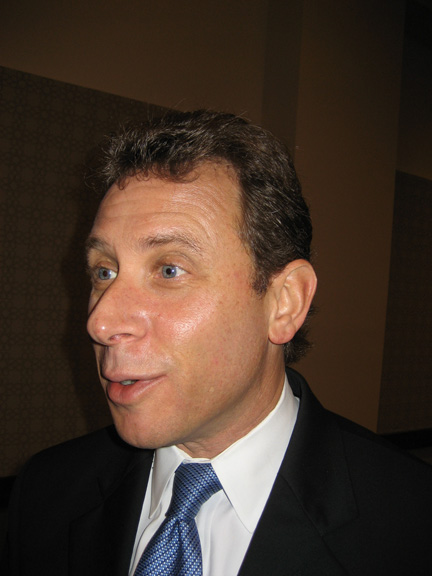 We’re in the third inning of a nine-inning game, with a lot of “devaluation” in the stock and property markets still to come. But Texas, Ground Zero of the ’80s S&L crisis, is better-positioned to ride out the debacle than many areas–though even here there’ll be no escaping this “total loss of confidence” in the financial system. That was the gloomy consensus of a panel of commercial-real estate experts this morning at a forum in North Dallas, where one guru likened the current situation to a “no-hide zone.” “Back in the ’80s, I could fly to Florida and San Francisco and still do deals there, but today you can’t go anywhere,” said Scott Lynn, president of Metropolitan Capital Advisors (at left). “Whether it’s Plano or Poughkeepsie, it’s all the same.”
We’re in the third inning of a nine-inning game, with a lot of “devaluation” in the stock and property markets still to come. But Texas, Ground Zero of the ’80s S&L crisis, is better-positioned to ride out the debacle than many areas–though even here there’ll be no escaping this “total loss of confidence” in the financial system. That was the gloomy consensus of a panel of commercial-real estate experts this morning at a forum in North Dallas, where one guru likened the current situation to a “no-hide zone.” “Back in the ’80s, I could fly to Florida and San Francisco and still do deals there, but today you can’t go anywhere,” said Scott Lynn, president of Metropolitan Capital Advisors (at left). “Whether it’s Plano or Poughkeepsie, it’s all the same.”
Lynn was one of three experts appearing at this morning’s forum, which was sponsored by the NTCAR group and drew roughly 400 attendees. His fellow panelists–Randall Fleisher of CBRE Capital Markets and Jack Minter of Jones Lang LaSalle–agreed that North Texas should fare relatively well in this downturn, in part because of oil and gas revenue and the region’s diversified economy.
“Every time I go to New York, you about have to take a flea bath to get it all off you,” Minter said with a laugh. “The guys up there are so depressed, there was so much over-leveraging. It’s a good thing the office-building windows are sealed, because otherwise they’d be jumping out of them.”
While Minter is bullish longterm–“Wall Street screwed it up, but they always figure out ways to reinvent themselves”–he predicted much more volatility in the markets in the months ahead. “You can’t have a huge boom for 10 years,” he said, “without seeing a period of protracted de-leveraging or devaluation.”
Lynn called that boom a “Niagara of capital” fueled by the global securitization system occurring from the late 1990s until 2007–a system built on exotic financial instruments that has now collapsed.
So, what does the collapse mean for commercial real estate in North Texas? “There’s going to be a severe tightening of credit at all levels,” Lynn said. “In the short-term, debt will be hard but not impossible to get, but it’s going to be more expensive. Equity will be very pricey, because of the increased risk.”
In the intermediate term, he predicted, property values will be re-examined and “pulled back.” By mid-2009 or 2010, “new lenders will come into the market to provide capital. But it’s going to be much more expensive.”
Fleisher, meantime, noted that local and regional banks are likely to benefit from the meltdown, especially those from the energy patch that are flush with cash. Lynn seemed to concur, pointing out that customers are moving more and more deposits into small and mid-sized commercial banks, aiming to forge relationships that will lead to future lending.
But he also had some words of warning.
“The dirty little secret is that lots of local and regional banks are just now having their loan portfolios reviewed by regulators,” he said. In some cases, “property today may not be worth what it was 10 years ago. So there will be issues of devaluation.”
Once that happens, Lynn concluded, “opportunistic capital is going to have a Red Apple Day. There’s billions of dollars of capital for distressed deals on the sidelines, just waiting” to get back in the game.






